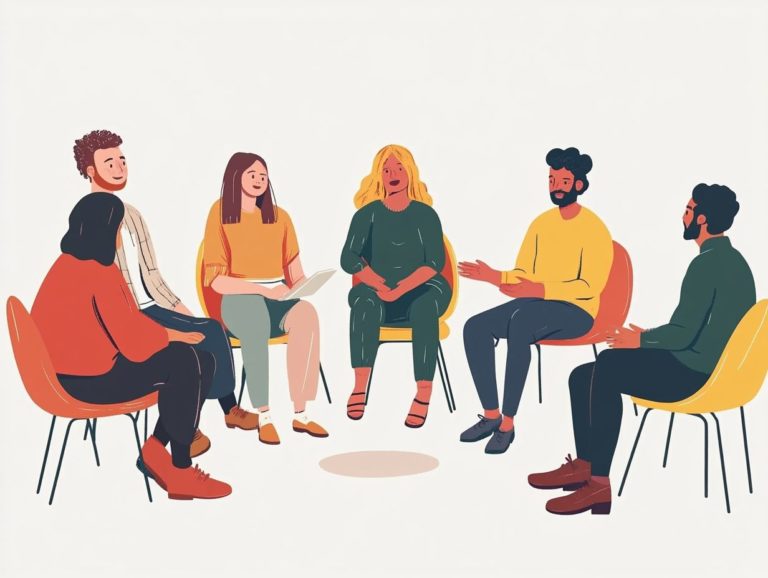5 Best Practices for Breaking Limiting Beliefs
Limiting beliefs often act as invisible barriers that prevent you from realizing your full potential. These self-imposed constraints typically arise from past experiences and can impact various facets of your life, from career aspirations to personal relationships.
This article shares strategies to identify and confront limiting beliefs. By doing so, you can replace negativity with positivity and take actionable steps toward personal growth.
Surround yourself with uplifting influences for a positive mindset. You can transform your outlook and embark on a meaningful journey toward success.
Contents
- Key Takeaways:
- 1. Identify Your Limiting Beliefs
- 2. Challenge Your Beliefs
- 3. Replace Negative Thoughts with Positive Ones
- 4. Take Action and Prove Your Beliefs Wrong
- 5. Surround Yourself with Positive Influences
- What Are Limiting Beliefs and How Do They Hold Us Back?
- Frequently Asked Questions
- What are some common limiting beliefs people have?
- What are the consequences of holding onto limiting beliefs?
- How can I identify my own limiting beliefs?
- What are some effective ways to break limiting beliefs?
- How long does it take to break a limiting belief?
- Can breaking one limiting belief help eliminate others?
Key Takeaways:

- Identify and acknowledge your limiting beliefs in order to begin addressing them.
- Challenge your beliefs by questioning their validity and exploring alternative perspectives.
- Replace negative thoughts with positive ones to cultivate a more empowering and productive mindset.
1. Identify Your Limiting Beliefs
Identifying your limiting beliefs is crucial for personal growth and self-improvement. These beliefs often come from societal conditioning or negative self-talk. They create barriers that hinder your potential.
By cultivating self-awareness, you can uncover these negative beliefs and begin dismantling the defenses that hold you back. Emotional exhaustion and impostor syndrome can complicate this journey. However, with mindfulness practices and introspective techniques, you can gain clarity on the beliefs that limit your success.
For instance, you might think you re not worthy of promotions at work, which often leads you to settle for less challenging roles. This belief can manifest as procrastination or avoidance of opportunities that could truly elevate your career.
Experts like Shannon Kaiser suggest journaling and guided visualization as effective tools for self-reflection. Nancy Colier emphasizes the importance of paying attention to the narratives you create for yourself.
By engaging in regular self-assessment, you can pinpoint these ingrained thoughts, nurturing a mindset that encourages growth and resilience. Ultimately, understanding these beliefs opens a clearer path to achieving your personal aspirations.
2. Challenge Your Beliefs
Challenging your beliefs is crucial for breaking free from the negative self-talk that fuels limiting beliefs. Implementing daily practices to break limiting beliefs can help you actively question these thoughts, allowing you to identify and dismantle the barriers that hold you back.
One effective strategy for this is changing the way you think about a situation. Instead of viewing a setback as a personal failure, see it as a valuable learning opportunity.
Seeking feedback from trusted team members helps foster a place where everyone feels safe to share ideas. This exchange not only validates new ideas but also encourages creativity, ultimately leading to innovative solutions that enrich workplace culture.
3. Replace Negative Thoughts with Positive Ones
Replacing negative thoughts with positive affirmations is a transformative technique that allows you to combat the insidious hold of negative beliefs.
By consciously choosing to embrace a more optimistic outlook, you can significantly reshape your mindset. This shift can truly transform your mental state and boost your resilience against life’s challenges!
To seamlessly integrate positive affirmations into your daily routine, consider setting aside a few moments each morning to:
- Recite enabling statements
- Write them in a journal
- Practice them during mindful moments throughout the day
When applied in team environments, fostering a culture of positivity can elevate morale, improving teamwork and boosting employee retention as individuals feel more valued and connected to their workplace.
Start today by reflecting on your beliefs and taking the first step toward a brighter future!
4. Take Action and Prove Your Beliefs Wrong

Taking action to challenge your limiting beliefs is a powerful strategy for personal development that builds strength and encourages you to embrace risk. For more insights, check out these 7 simple steps to transform limiting beliefs.
When you dare to step outside your comfort zone, you often discover hidden strengths and capabilities that fear has kept hidden. Consider the story of a woman who, after years in a predictable office job, decided to pursue her passion for painting.
By showcasing her work in local galleries, she not only achieved success but also reignited her confidence and sense of purpose.
This example illustrates how embracing uncertainty can lead to profound personal growth. In the workplace, such bold decisions can enhance creativity and collaboration.
When you actively confront your self-imposed limitations, you open the door to remarkable breakthroughs, both personally and professionally.
5. Surround Yourself with Positive Influences
Surrounding yourself with positive influences can elevate your emotional intelligence and enhance team communication. This creates an environment that nurtures creative ideas.
Encouraging harmonious relationships leads to a drop in stress levels and an increase in overall well-being.
You ll likely see that these benefits boost your team’s efficiency.
To foster these positive interactions, prioritizing a culture of trust and respect is essential.
Regular team-building activities, open channels for feedback, and acknowledging individual contributions can further solidify these relationships.
Cultivating psychological safety, which allows team members to express their thoughts and concerns without fear of judgment, paves the way for innovation and a more engaged workforce.
What Are Limiting Beliefs and How Do They Hold Us Back?
Limiting beliefs are those stubborn thoughts that can seriously hold you back from achieving your dreams. They stifle your ability to succeed and maintain emotional balance, often driven by fear and societal conditioning.
These self-limiting beliefs can manifest as toxic mindsets that undermine your self-esteem and hinder personal growth. They don’t just affect your mental health; they ripple out to impact workplace culture and team dynamics.
This creates barriers to effective communication and innovation. Acknowledging these belief systems is essential for breaking free from their constraints and fostering a healthier mindset.
Cognitive roadblocks appear in many forms, like believing you’re not skilled enough to apply for a promotion or thinking that failure somehow reflects your worth.
Influential thinkers like Vicki Messenger highlight that pinpointing these harmful patterns is a crucial first step toward your own liberation.
Similarly, Sebene Selassie points out that confronting limiting beliefs can spark profound personal transformation, unlocking possibilities that may have seemed out of reach, as highlighted in 5 daily affirmations to break limiting beliefs.
By understanding and addressing these beliefs, you can enhance your own life and contribute to a more positive and growth-oriented environment, both personally and professionally.
How Do Limiting Beliefs Develop?
Limiting beliefs often emerge from a complex interplay of childhood experiences, personal encounters, and societal conditioning. These significantly shape your worldview and self-perception.
Influential figures’ comments during your formative years like those made by parents, teachers, or even peers often instill a sense of inadequacy or fear of failure.
Societal norms and cultural expectations further cement these notions, creating a framework for gauging your self-worth. Past failures can etch themselves permanently in your psyche, fostering a hesitance to embrace risks.
Fortunately, many individuals can liberate themselves from these constraints by employing awareness techniques like mindfulness and cognitive reframing, which means changing the way you think about a situation.
These techniques promote a deeper understanding of ingrained beliefs and enable you to challenge and reshape your narrative, paving the way for a more fulfilling and authentic existence.
What Are the Common Types of Limiting Beliefs?

Common types of limiting beliefs include impostor syndrome and negative self-worth thoughts. These beliefs can significantly undermine your self-esteem.
These beliefs often manifest as a nagging sense of inadequacy. You might feel you don t deserve your achievements or that you aren t as capable as others believe you to be. For example, it s not uncommon for someone to brush off their accomplishments as mere luck or to credit others for their successes. This creates a cycle of self-doubt that stifles personal and professional growth.
Such mental barriers can inhibit your creativity and discourage risk-taking. They can also keep you from seizing opportunities that could transform your life. The first step in overcoming these limiting beliefs is recognition, followed by reframing those negative thoughts and practicing self-compassion to foster a more enabling mindset.
How Can Limiting Beliefs Affect Our Lives?
Limiting beliefs can profoundly impact your life, leading to emotional exhaustion and hindering your mental health. They can also drag down team morale in professional settings.
When you start to doubt your capabilities, it s easy to get caught in a cycle of undermining your own success. This diminishes your performance and can create a toxic atmosphere for your colleagues. For instance, a tech startup had a project manager who believed they weren t capable of effectively leading their team. This mindset stifled their growth and held back the team’s potential, causing missed deadlines and stifled creativity.
After attending a workshop on overcoming limiting beliefs, they found the confidence to delegate tasks and foster collaboration. This change revitalized their mental health and transformed the workplace culture, resulting in heightened productivity and a more positive environment.
What Are Some Strategies for Overcoming Limiting Beliefs?
You have several effective strategies for overcoming limiting beliefs, including self-reflection, mindfulness practices, and 5 essential skills to break limiting beliefs, as well as restructuring negative feedback loops.
Incorporating techniques like journaling allows you to delve into your deeply rooted thoughts and feelings. This helps you gain clarity on the origins of these beliefs. Mindfulness practices, such as meditation and deep-breathing exercises, help you stay present and challenge those negative thought patterns.
Establishing a habit of positive affirmations fosters a resilient mindset. This gradually transforms your internal dialogue from self-doubt to self-enablement. Engaging in regular self-reflection helps you track progress, celebrate small victories, and reinforce your positive changes.
This creates a sustainable feedback loop that champions continual growth and resilience.
How Can Breaking Limiting Beliefs Lead to Personal Growth and Success?
Breaking limiting beliefs transforms your life and unlocks amazing personal growth and success through the adoption of top strategies to conquer limiting beliefs and resilience strategies.
When you let go of the mental barriers that have held you back, you unlock a world of possibilities that you never thought you could achieve. For example, a young entrepreneur once paralyzed by fears of failure embraced a growth mindset. They launched a successful tech startup, resulting in both professional triumphs and a boost in self-worth.
An organization that encouraged its employees to break free from self-imposed limitations saw a remarkable surge in innovation and collaboration. When individuals or teams believe in their potential, incredible transformations occur. The journey toward expanded opportunities enhances self-esteem and fosters a thriving environment for continuous improvement.
Frequently Asked Questions

Take the first step towards overcoming your limiting beliefs today by exploring 5 common limiting beliefs and how to overcome them. Embrace the journey of growth and success!
What are some common limiting beliefs people have?
Some common limiting beliefs are: “I’m not good enough,” “I’ll never be successful,” and “I don’t deserve happiness.” Others include feelings of being too old or young and thinking, “I’m not smart enough.”
What are the consequences of holding onto limiting beliefs?
Holding onto these beliefs leads to self-doubt and low self-esteem. They can block personal growth and damage relationships.
How can I identify my own limiting beliefs?
Pay attention to your inner dialogue. Look for any negative thoughts and challenge them to see if they are limiting beliefs.
What are some effective ways to break limiting beliefs?
Replace limiting beliefs with positive affirmations. To further support your journey, consider exercises to overcome limiting beliefs, seek support from a therapist or coach, practice kindness to yourself, and question the evidence behind your beliefs.
How long does it take to break a limiting belief?
The time varies based on the intensity of the belief and individual factors. With consistent effort and awareness, breaking these beliefs is possible.
Can breaking one limiting belief help eliminate others?
Yes! Breaking one limiting belief can create a positive ripple effect on others. When you challenge one belief, you build confidence to tackle the rest.






